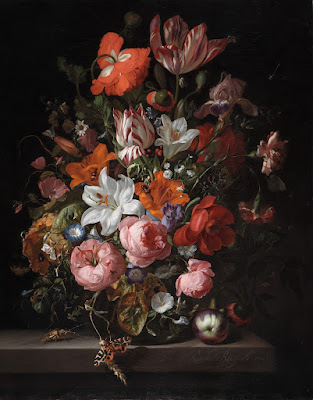-Jardin-au-Petit-Gennevilliers-1893-oil-on-canvas-Mus%C3%A9e-Marmottan-Monet-Paris.jpg) |
| Gustave Caillebotte Chrysanthemums: Jardin au Petit Gennevilliers 1893 oil on canvas Musée Marmottan Monet, Paris |
 |
| Lovis Corinth Chrysanthemums and Calla Lilies 1924 oil on canvas Landesmuseum Hannover |
 |
| Henri Fantin-Latour Flower Still Life Autumn Chrysanthemums in a White Vase 1889 oil on canvas Städel Museum, Frankfurt |
 |
| Gottfried Wilhelm Völcker Floral Still Life with Dahlias 1823 oil on canvas Alte Nationalgalerie, Staatliche Museen zu Berlin |
 |
| Jacobus Linthorst Flowers in a Stone Vase ca. 1800 oil on panel Museum of Fine Arts, Budapest |
 |
| Jacob van Walscapelle Floral Still Life ca. 1685 oil on canvas Museum of Fine Arts, Boston |
 |
| Rachel Ruysch Flowers in a Glass Vase 1704 oil on canvas Detroit Institute of Arts |
 |
| Vincent van Gogh Vase with Carnations 1886 oil on canvas Detroit Institute of Arts |
 |
| Jan van Huysum Still Life with Flowers 1723 oil on panel Rijksmuseum, Amsterdam |
 |
| Jan van Kessel the Elder Flowers in a Glass Vase ca. 1660 oil on panel Kunsthaus Zürich |
 |
| Jean-Baptiste Monnoyer Flowers in a Ceramic Vase ca. 1670-80 oil on canvas Musée des Beaux-Arts de Lyon |
 |
| Jan Brueghel the Elder Bouquet of Flowers in a Vase ca. 1610 oil on panel Musée d'Art et d'Histoire de Genève |
 |
| Jan Brueghel the Elder Bouquet of Flowers in a Vase ca. 1615 oil on panel Romanian National Museum of Art, Bucharest |
-High-Museum-of-Art-Atlanta.jpg) |
| Jan Brueghel the Elder Holy Family within a Garland (central vignette by anonymous collaborator) ca. 1620 oil on panel High Museum of Art, Atlanta |
 |
| Ferdinand Georg Waldmüller Bouquet in Grecian Urn with Silver Vessels ca. 1840 oil on panel Alte Nationalgalerie, Staatliche Museen zu Berlin |
-Hamburger-Kunsthalle.jpg) |
| Justus van Huysum Basket of Flowers ca. 1690 watercolor (study for an overdoor panel in oils) Hamburger Kunsthalle |
Mortimer senior:
Nephue, I must to Scotland, thou staiest here.
Leave now to oppose thy selfe against the king,
Thou seest by nature he is milde and calme,
And seeing his minde so dotes on Gaveston,
Let him without controulement have his will.
Thou seest by nature he is milde and calme,
And seeing his minde so dotes on Gaveston,
Let him without controulement have his will.
The mightiest kings have had their minions,
Great Alexander lovde Ephestion,
The conquering Hercules for Hilas wept,
Great Alexander lovde Ephestion,
The conquering Hercules for Hilas wept,
And for Patroclus sterne Achillis droopt:
And not kings onelie, but the wisest men,
The Romaine Tullie loved Octavius,
Grave Socrates, wilde Alcibiades:
Grave Socrates, wilde Alcibiades:
Then let his grace, whose youth is flexible,
And promiseth as much as we can wish,
Freely enjoy that vaine light-headed earle,
For riper yeares will weane him from such toyes.
And promiseth as much as we can wish,
Freely enjoy that vaine light-headed earle,
For riper yeares will weane him from such toyes.
Mortimer:
Unckle, his wanton humor greeves not me,
But this I scorne, that one so baselie borne,
Should by his soveraignes favour grow so pert,
Should by his soveraignes favour grow so pert,
And riote it with the treasure of the realme,
While souldiers mutinie for want of paie.
He weares a lords revenewe on his back,
And Midas like he jets it in the court,
With base outlandish cullions at his heeles,
While souldiers mutinie for want of paie.
He weares a lords revenewe on his back,
And Midas like he jets it in the court,
With base outlandish cullions at his heeles,
Whose proud fantastick liveries make such show,
As if that Proteus god of shapes appearede.
I have not seene a dapper jack so briske,
He weares a short Italian hooded cloake,
As if that Proteus god of shapes appearede.
I have not seene a dapper jack so briske,
He weares a short Italian hooded cloake,
Larded with pearle, and in his tuskan cap
A jewell of more value then the crowne.
Whiles other walke below, the king and he
From out a window, laugh at such as we,
And floute our traine, and jest at our attire:
Unckle, tis this that makes me impatient.
A jewell of more value then the crowne.
Whiles other walke below, the king and he
From out a window, laugh at such as we,
And floute our traine, and jest at our attire:
Unckle, tis this that makes me impatient.
– Christopher Marlowe, Edward II, Act I, scene iv (1593)